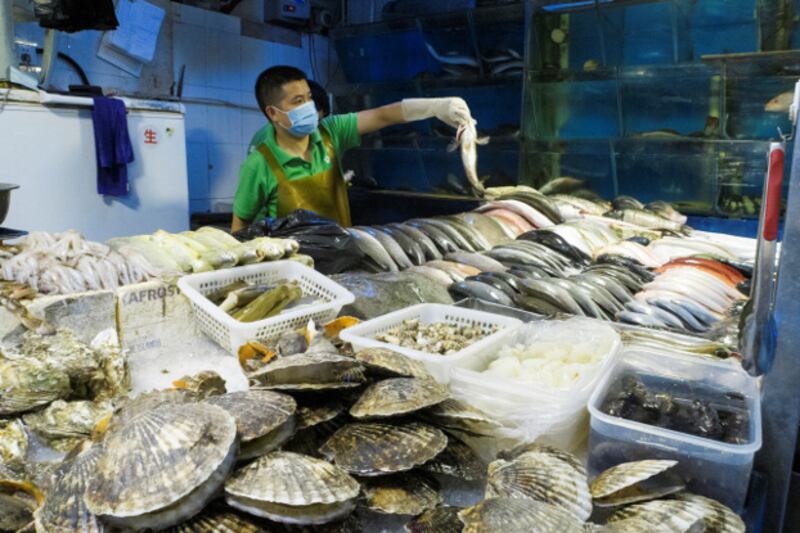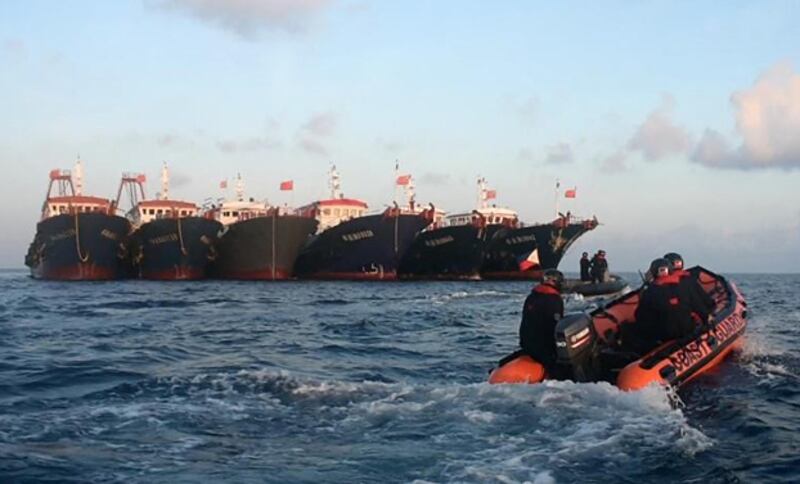A collapse of fishery stocks in the South China Sea caused by overfishing and climate change could fuel serious tensions and even armed conflict, one of the authors of a new report on the topic has warned.
“The simmering conflict that we see in the South China Sea is mostly because of fish even though countries don’t say it out loud,” Rashid Sumaila, a professor at the University of British Columbia in Canada, told BenarNews on Wednesday.
Sumaila, from the university's Institute for the Oceans and Fisheries and its School of Public Policy and Global Affairs, co-authored a report titled " Sink or Swim: The Future Of Fisheries In the East And South China Sea." He and other fisheries scientists and economists examined the impacts of climate change and overfishing in the region's oceans.
The report said under a scenario in which global temperatures rise by 2 degrees Celsius by 2050, the South China Sea is “likely to experience significant declines in key commercial fish and invertebrate species, placing many regional fishing economies at risk of devastating failure.”
Regional fisheries in the South China Sea are estimated to generate $100 billion annually, supporting the livelihoods of about 3.7 million people, which the report says will be at risk.
China’s growing need for fish-based feed, not just fish for human consumption, is a key driver of overfishing in the East China Sea and the South China Sea, according to the report.
“Fishery is one of the reasons China is entangled in disputes with its neighbors in the South China Sea,” Sumaila said.
The report’s researchers urged immediate action to reduce fishing. They called for increased international cooperation to prevent the catastrophic fisheries collapse they are predicting.

Fighting over fish
The link between overfishing and maritime conflicts has been witnessed all over the world. One of the more notable incidents was the “cod war” between the United Kingdom and Iceland that continued for nearly 20 years beginning in 1958.
Navies from both countries were deployed to protect rival fishermen until government leaders reached an agreement in 1976 through diplomacy.
More recently, increased attacks by pirates in the waters off the coast of the East African nation of Somalia were attributed to the depletion of seafood resources through illegal fishing.
Some researchers including John Quiggin, professor of economics at the University of Queensland, have a different perspective – that it is disputes and lawlessness that put pressure on fish stocks.
“Unresolved conflict increases risk of overfishing and collapse,” Quiggin said.
“As the Iceland-U.K. cod war and the Somali episode both showed, the optimal solution is for states to regulate exclusive economic zones (EEZs) with catch quotas,” he said. “Best outcome in South China Sea would be for a negotiated agreement.”
Sumaila, meanwhile, said “the best thing the countries sharing the South China Sea can do is to recognize the immense value of the fisheries of this sea and to cooperate to manage the fisheries sustainably.
“They could learn from Norway and Russia, who have decided to manage Barents Sea cod fisheries cooperatively even during the Cold War between the then-Soviet Union and the West because they recognized how important this fishery is to their citizens.”
“I believe this can be done for the South China Sea too,” Sumaila said.

Illegal fishing
Separately, the South China Sea Probing Initiative (SCSPI), a Chinese think tank, has alleged that illegal fishing, in particular by Vietnamese fishermen, has “seriously undermined regional mutual trust-building and posed a huge threat and challenge to maritime cooperation, conservation of fishery resources and security of neighboring countries.”
In a new report, the SCSPI said Vietnam operates about 9,000 fishing boats in the South China Sea and got into fishing conflicts with China, Indonesia and Malaysia.
Vietnamese authorities were not available for comment but Vietnamese media have reported on the government’s efforts to fight illegal, unreported and unregulated (IUU) fishing, especially after the European Commission issued a “yellow card” warning against Vietnam’s fishing violations in 2017.
Prime Minister Pham Minh Chinh had ordered local governments to stamp out IUU fishing by the end of 2021 and leaders of Vietnam’s 28 coastal provinces committed to stop fishing boats from encroaching on foreign waters.
China, however, is still ahead of other countries in terms of IUU fishing. A Global Illegal Fishing Index created by the Global Initiative against Transnational Organized Crime ranked China the worst offender in 2019.
With up to 800,000 vessels, China’s fishing fleet is by far the largest in the world and Chinese fishermen, having exhausted domestic grounds, are known to have traveled to distant waters such as the Gulf of Guinea in West Africa or the Galapagos Islands off Ecuador for their catches.
In the South China Sea, China has been accused of operating a fleet of armed fishing militia to enforce its sweeping sovereignty claims which are disputed by its neighbors, including Vietnam.
The RAND Corp., a U.S. think tank, said China has been carrying out classic "gray zone" operations designed to "win without fighting" by overwhelming the adversary with swarms of fishing boats usually bolstered from the rear by coast guard and possibly naval ships.
